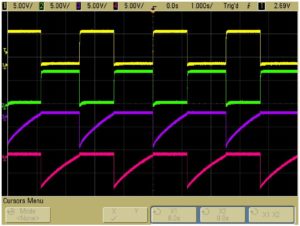Learning Goals
 In the electronics laboratory course, students learn the fundamentals of electronics and measurement techniques, as well as the critical analysis of measured data. The time at which this course is taken is chosen for students so that the skills learned here can be applied in the advanced laboratory course and in the bachelor thesis and that they eventually can fully focus on physics.
In the electronics laboratory course, students learn the fundamentals of electronics and measurement techniques, as well as the critical analysis of measured data. The time at which this course is taken is chosen for students so that the skills learned here can be applied in the advanced laboratory course and in the bachelor thesis and that they eventually can fully focus on physics.
The electronics laboratory course consists of the following subjects:
- fundamentals of electronics (simple switches, electronic assembly parts
- circuit diagrams
- using electronics laboratory measurement instruments
- signal filters and signal propagation
- transistors and operational amplifiers
- amplifiers in measurement techniques (including ECG amplifier and lock-in amplifier)
- sensors
- feedback control
- digital electronics
- analog-digital conversion
- microcontrollers
- creation of circuit boards and soldering
Students learn in the process:
- how to use circuit diagrams, breadboards, and electronic assembly parts
- the functions of electronic assembly parts
- the construction of their own circuits (circuit diagram, layout, soldering)
- construction and application of integrated circuits
- fundamentals of electronic measurement devices and possible sources of error
- modern electronic measurement devices
- PC-supported measurement acquisition
- independent way of working
- the evaluation of measurements and critical assessment of measurement values
- the presentation of results by means of modern media
- teamwork
- structured research data management using electronic lab notebooks